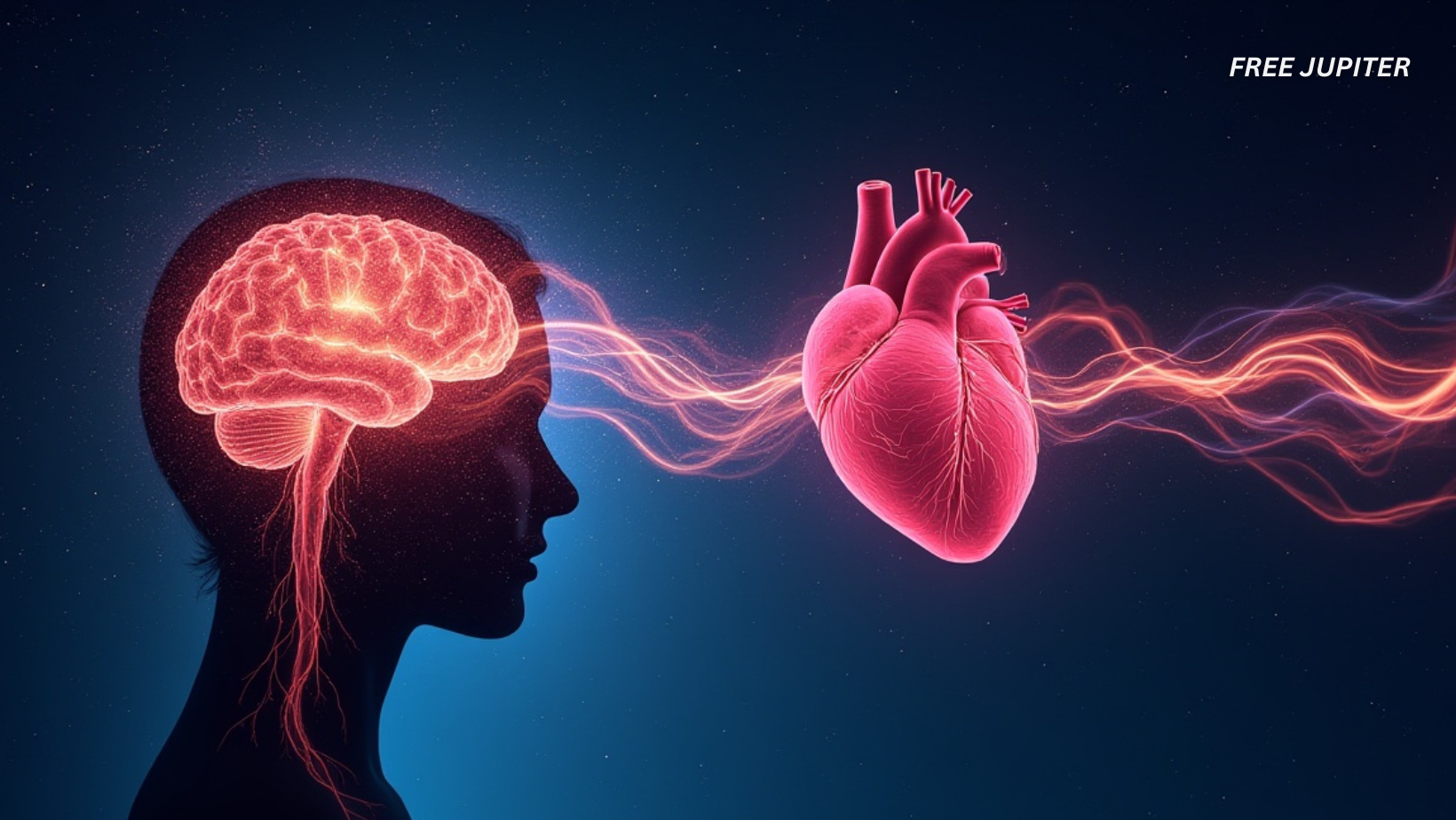Friendly Note: FreeJupiter.com shares general info for curious minds 🌟 Please fact-check all claims—and always check health matters with a professional 💙
For centuries, the heart has been considered the emotional core of our being—a symbol of love, courage, and instinct. While modern science often places the brain on the throne of control, new research suggests the heart might actually be running its own behind-the-scenes show. And not just poetically—it might literally have a mind of its own.
The Heart’s Secret Nervous System
At the center of this discovery is something called the intracardiac nervous system (ICNS). Think of it as the heart’s very own internal network of nerves—a sort of “mini brain” embedded right inside the heart muscle. This nervous system helps regulate heartbeat rhythm, process incoming signals, and adjust heart activity depending on what’s happening in the body.
For years, scientists assumed the brain’s autonomic nervous system (which controls involuntary functions like breathing and digestion) was the sole conductor of the heart’s rhythmic symphony. But as it turns out, the heart is more like a skilled jazz musician—able to improvise and keep tempo on its own.
Recent studies on zebrafish—those tiny, transparent fish that make genetic studies easier—revealed just how sophisticated this system is. Researchers were stunned to find a rich diversity of nerve cells around the heart, including neurons that are similar to those used in rhythmic bodily activities like breathing and walking.
This challenges the traditional view of the heart as merely a reactive organ. Instead, it appears the heart can interpret and respond to signals independently, without waiting for the brain to chime in every time.
A Little Brain in the Chest?
The idea of the heart having its own intelligence isn’t new in all circles. In fact, a field of study known as neurocardiology has been exploring the relationship between the brain and the heart for decades. In 1991, researchers at the HeartMath Institute even began referring to the heart’s internal network as the “heart brain.”
According to their findings, the heart sends far more signals to the brain than the brain sends to the heart. These messages can influence emotion, decision-making, and even memory. While that area of research remains controversial in mainstream science, new studies like the one involving zebrafish are lending credibility to the idea that the heart has a more independent role in body regulation than previously assumed.
In fact, some researchers compare the heart’s nervous system to the enteric nervous system—the network of neurons in your gut often called the “second brain.” Just like your digestive system doesn’t need constant instructions from the brain to do its job, the heart, too, might be operating with a surprising amount of autonomy.
Read more: This Is What Happens to Your Body When You Eat Too Many Strawberries: Science
Why Use Zebrafish?
Zebrafish may seem like unlikely heroes in heart research, but they’re actually ideal for this kind of study. Because their embryos are transparent, scientists can easily observe their internal systems without needing to do invasive surgery. Zebrafish also share many of the same genetic structures with humans, especially when it comes to heart function.
By studying the zebrafish’s heart nerves under microscopes, using fluorescent dyes, RNA sequencing, and electrical monitoring, scientists managed to build a high-resolution map of how the heart’s nervous system functions and adapts. What they discovered was not only unexpected—it was game-changing.
Implications for Heart Disease and Beyond
Understanding the complexity of the heart’s own nervous system could be a breakthrough for treating heart diseases—especially arrhythmias, which are irregular heartbeats. Traditional treatments often focus on the brain’s control mechanisms or use external pacemakers to regulate rhythm. But what if we could instead tap into the heart’s own “inner wiring” to fix the problem?
This research opens the door to new therapies that might target the heart’s own neurons. Imagine medications or treatments that enhance the heart’s self-regulating system rather than override it. Or custom-designed interventions that help the heart “learn” to correct its rhythm naturally after a heart attack or stress-induced trauma.
There’s even speculation that lifestyle factors like diet, exercise, and mental well-being might directly influence the heart’s nervous system, not just its muscle. If the ICNS is responsive to stress or environmental changes, then maintaining emotional and physical balance might protect the heart in ways we haven’t fully appreciated yet.
Read more: New Study Finds the Human Brain Processes Reality in Up to 11 Dimensions
Other Studies That Support a “Thinking” Heart
This idea isn’t floating out in scientific space all alone. Other studies support the notion of a more intelligent, responsive heart. For example:
- Vagal tone research has shown that the heart’s interaction with the vagus nerve plays a vital role in emotional regulation and stress recovery. People with higher vagal tone tend to recover faster from stress and have more stable heart rhythms.
- In heart transplant patients, the heart can still beat and function without being connected to the recipient’s brain. This shows that the heart can maintain rhythm on its own—even in the absence of its original neural connections.
- There are even recorded cases where people with transplanted hearts took on certain behaviors or preferences of the donor—a controversial phenomenon often referred to as cellular memory, though the science is still inconclusive.
The Bigger Picture
All this doesn’t mean the heart is smarter than the brain or that it’s fully independent. But it does mean that the heart is a much more active player in bodily regulation than we previously believed. Rather than being a silent soldier, marching to the beat of brain commands, the heart may be a co-pilot in the human body’s day-to-day functions.
This realization brings a new appreciation not just for medical science, but for how we understand ourselves. It bridges the poetic and the practical. Maybe, just maybe, there’s more truth than we realized to the old saying: “Follow your heart.”
Read more: Nutrition Experts Name the Healthiest Sandwich Bread—And They All Said The Same Thing
Final Thought: Listening to the Heart—Literally and Figuratively
As scientists continue to peel back the layers of our biology, what was once considered simple turns out to be staggeringly complex. The heart, long symbolized as the seat of emotion and instinct, may in fact be quietly shaping our responses to the world—not just reacting, but choosing, interpreting, and even influencing how we feel and act.
In this light, taking care of your heart means more than avoiding cholesterol or cutting back on sugar. It may also mean respecting its autonomy, tuning into its rhythms, and giving it space to do what it was uniquely built to do: keep you alive, aware, and maybe even a little wise.
So next time you feel your heart race with excitement or skip a beat during a tender moment, remember—it’s not just muscle. It’s part of a beautifully complex system that might just know more than we’ve given it credit for.
Disclaimer: The information in this article is for general informational purposes only and is not medical advice. We are not doctors, and this website is run as a family hobby project. Always consult a qualified healthcare professional before making decisions about your health. Please fact-check any claims and use this content as a starting point, not a substitute for professional guidance.










